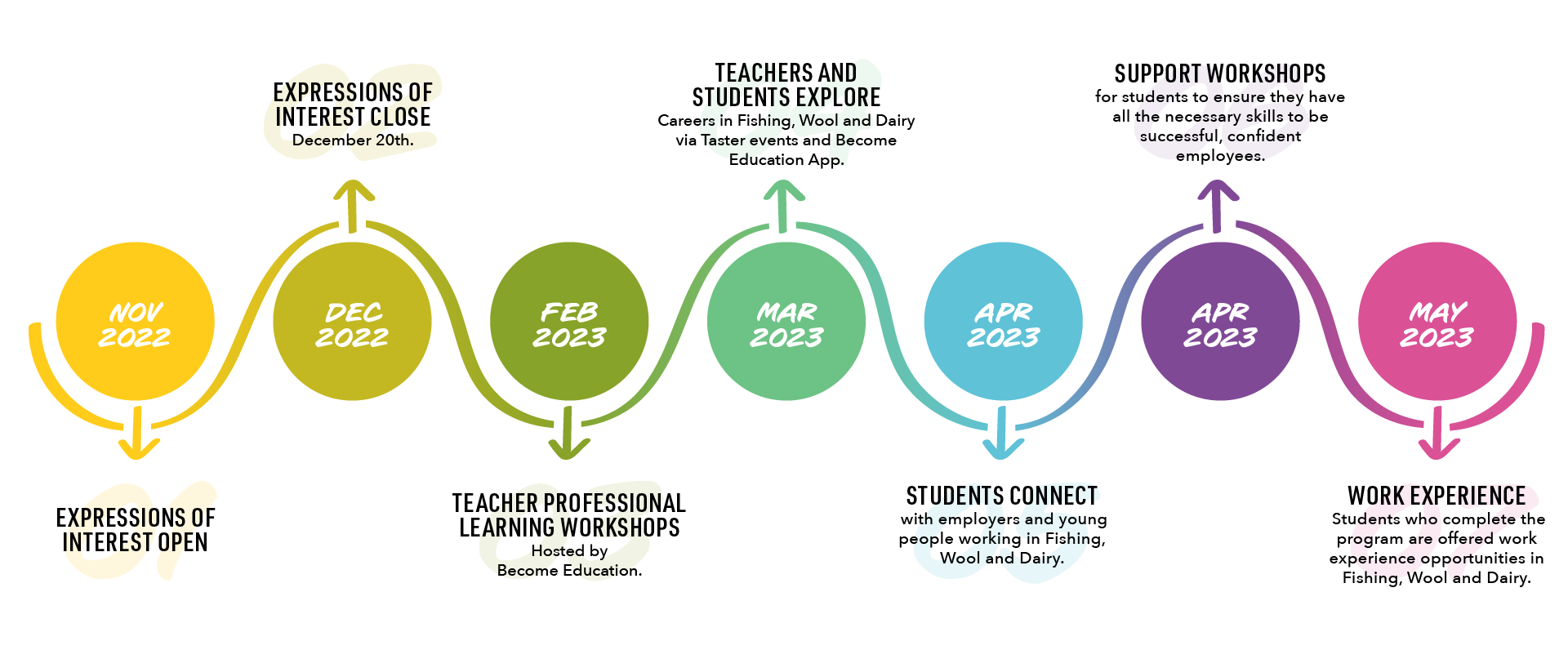


Few areas are more critical to the security and well-being of young people than decent work. It impacts on every aspect of their lives: independence; mental health and well-being; and social interaction. Action4Youth aims to offer young people an enriching experience of work that sets them on the path to independence and future security.
Program outcomes include:

ACTION4YOUTH brings together community groups, schools, TAFE, universities, and industry to support young people from all backgrounds, especially those from disadvantaged places, to EXPLORE a career in agriculture.

Through the program, young people CONNECT with businesses and new job opportunities in the agriculture sector. Participants who complete the whole program will be offered work placements with our agriculture project partners from the wool, dairy, and fishing industries.
Overview of SUPPORT provided for CONNECT Phase
Download the flyer to see an example of the opportunities ACTION4YOUTH will provide students as part of the CONNECT and SUPPORT phase.

ACTION4YOUTH will provide SUPPORT in the form of personal growth, leadership development and workplace/career mentors to navigate work placements offered by our trusted industry partners. In addition, ACTION4YOUTH participants will be involved in training focusing on workforce engagement to ensure they have all the necessary skills to be successful, confident employees.

View the program logic to see the ACTION4YOUTH activities, short term and long outcomes

"The ACTION4YOUTH initiative from Action4Agriculture and Become Education aims to raise awareness of the diversity of agricultural careers amongst primary and secondary school students in Australia, while also encouraging young people to understand why 'some of the coolest jobs exist near the wickedest problems'. What really stands out about this program is not just the move away from looking at job roles within a vacuum towards a more contextual understanding (e.g. exploring the problems in the world that need solving, such as food scarcity, and how an industry can contribute to this) but also the intention to encourage young people to consider topics beyond the realms of traditional careers education, such as:
For me, this is a brilliant way to empower young people with career management skills and support them and their parents/carers to navigate an increasingly chaotic world, as well as mitigate the sense of 'information overload' that we so often hear as careers professionals, reflected in the quote from Holly Paster, Careers and Transition Adviser at Bomaderry High School.”
– Chris Webb University of Huddersfield and Host of #WeAreCareers Show Careers and Transition Adviser

“I think parents want to support their children and they’re looking for information to do that, which is really quite difficult because there’s just so much out there. It’s the opposite of how it used to be, where they couldn’t get the information; now there’s just so much that it’s overwhelming.. Having one central area [such as BECOME] where they can access quality advice and evidence-based careers education, is what we think is critical. Opening both student and parent eyes to different career pathways is a goal of ours.”
– Holly Paster, Careers and Transition Adviser at Bomaderry High School.
“Research shows that young people have a narrow idea of the world of work. They can hold simplistic or outdated ideas of careers. Agriculture is a prime example of a dynamic, changing and diverse field that is open to students of all backgrounds and interests. Agriculture can offer engaging careers for those with specialty knowledge from engineering to agribusiness, plant and animal systems, logistics, ecology, production processes and technology – to name only a few!”
– Liv Pennie, Become Education.
Action4Agriculture, through programs like ACTION4YOUTH, is committed to working with our partners in industry, education, and community to make sure the agriculture sector is the opportunity of choice, where every individual is valued for their role in nourishing our nation.